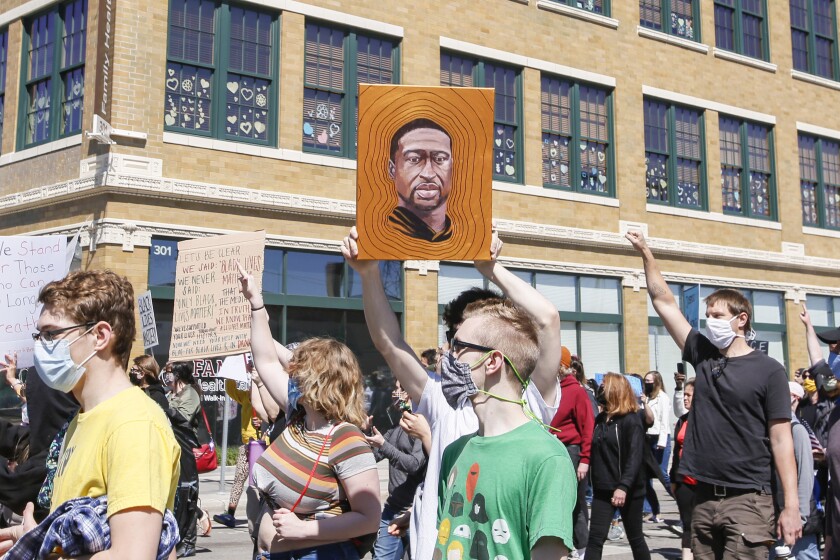Protesters marched Saturday morning and afternoon in cities across Minnesota and North Dakota, chanting and carrying signs to mark the memory of George Floyd, a black man who died Monday after he was pinned down for nearly nine minutes by a white Minneapolis police officer.
Demonstrations were held in Fargo, Bismarck, Bemidji, Rochester, Willmar and Duluth, among others. A protest also was planned to take place later Saturday evening in East Grand Forks.
In Fargo, there was a 2,000-person march through the city . Demonstrators chanted “I can’t breathe” – three of Floyd’s dying words – plus a call-and-response: “What’s his name? George Floyd!”
ADVERTISEMENT
“We are not looked upon as human beings. We are looked at as people who were once property,” organizer Ritchell Aboah, who’s also a candidate for Fargo City Commission, told demonstrators as they organized Saturday morning. “We are tired of injustice. We are tired of crying. Now it is our time, and we ask that everyone stand with us.
Some city leaders, including Fargo Mayor Tim Mahoney and Moorhead Mayor Jonathun Judd, met with demonstrators . Mahoney joined a “black lives matter” chant outside police headquarters and Judd filtered through the crowd. Other Fargo officers held or posed for photographs next to signs that read “one race ... the human race!” and “justice for George.”
Later Saturday, the protests turned ugly, as law enforcement had to use teargas to disperse crowds downtown and the city of Fargo declared a state of emergency because of the protests.
In Bismarck, about 300 people carried signs and chanted as they marched a loop through the city and occasionally blocked traffic. Opie Day, a 44-year-old citizen of the Bois Forte Band of Chippewa who moved to Bismarck from the Twin Cities, led a drum group beforehand.
“Not being able to be home in person, this is my way of contributing and letting them know that I’m with them," Day said. He also said he has been pulled out of cars and off of buses by law enforcement, which he believes is a product of his skin color.
In Duluth, about 1,000 people gathered for a similar demonstration at the Clayton Jackson McGhie Memorial , which commemorates the three black men who were lynched on that spot by a mob in 1920 . Organizers there held a similar protest on Wednesday, which drew more than 100 people.
In Bemidji, between 300 and 400 marchers headed from the city’s iconic statues of Paul and Babe – which briefly became a racial flashpoint when someone painted “genocide” on the ox’s flank in early 2019 – to the Bemidji Police Department’s headquarters about half a mile away.
"The virus of racism is passed down from mother to daughter, from father to son," David Frison, a Bemidji State University professor, told marchers. "When liberty is denied to all citizens, we can't breathe, America."
ADVERTISEMENT
And in Rochester, more than 100 people marched through the center of the city, chanting “I can’t breathe” like their counterparts across the region. On Friday night, demonstrators there blocked Hwy. 52 and a few other downtown intersections. They ultimately broke a few windows , including one on a police cruiser. Civic leaders have instituted a 9 p.m. curfew on Saturday in the city’s core.
But, other than a few thrown water bottles in Bismarck, the demonstrations in Rochester and Bemidji were the only ones outside the Twin Cities that reported any violence. Both instances were minor by comparison.
In Bemidji on Saturday, demonstrators began roughing up a school resource officer’s truck and, as organizers pulled them back, a police officer hopped into the truck and backed it through some of the demonstrators as he drove away. It was not immediately apparent if any demonstrators were injured, and organizers and police officers shook hands after the confrontation.
Saturday afternoon, the city of Bemidji announced an 8 o'clock curfew for Saturday evening.
The marches and protests across Greater Minnesota have been smaller and more peaceful than those in the Metro, where Floyd’s killing has meant days of demonstrations that have sometimes turned to violence, including the takeover and burning of a police precinct and the ransacking of dozens of businesses, prompting Gov. Tim Walz to order the largest-ever mobilization of the Minnesota National Guard on Saturday.
No one has died in the widespread protests there, but demonstrators, police and journalists all have reported myriad injuries. The protests also have turned toward looting and arson, and state and city leaders suggested on Saturday that the Twin Cities demonstrations have been joined by out-of-state agitators.
About 15 protesters walked in and around downtown Willmar with signs reading “Black Lives Matter,” “Justice For Floyd,” and “I Can’t Breathe,” the words Floyd spoke moments before his death.
Minneapolis, St. Paul and a multitude of surrounding suburbs instituted an 8 p.m. curfew on Saturday. The Minnesota Department of Transportation also announced major interstates and highways into the Twin Cities would close at 7 p.m. until 6 a.m. Sunday.
ADVERTISEMENT
Forum News Service's Jeremy Turley contributed to this report












